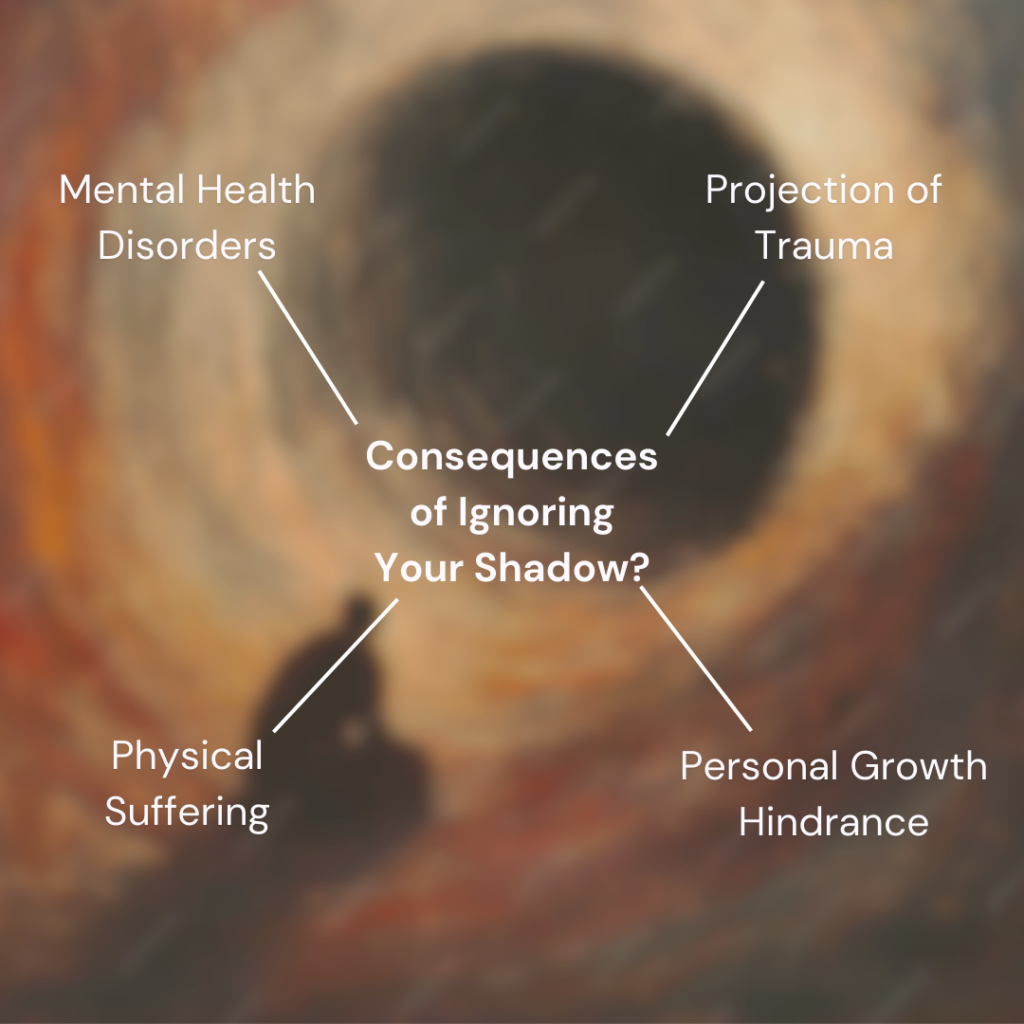“We’ve all got both light and dark inside us. What matters is the part we choose to act on. That’s who we really are.”
– Sirius Black, Harry Potter and the Order of Phoenix
Your spiritual body is made up of both, light and dark aspects.
The light self refers to the higher consciousness i.e., the lighter or the higher-vibrational side of you while the shadow self is made up of suppressed negative emotions, trauma, and limiting beliefs.
If not worked upon, these negative aspects of your personality can appear in your actions subconsciously and impact your life and relationships. Thus, Shadow work becomes crucial.
Shadow work is the act of working with the shadow self to address and heal wounds.
In this blog post, you will learn about Shadow Work, Swiss psychiatrist Carl Jung’s theory of the shadow archetype, and 14 Breakthrough Shadow Work Journal Prompts.
Interested in making your blogs rank or engaging in spiritual conversations? Contact us here or drop a mail.

Table of Contents
What is Shadow Work?
Shadow work refers to integrating and working on the parts of your personality that you have hidden.
Sometimes in life, you go through circumstances that evoke feelings of shame, guilt, and fear.
Due to conditioning and societal pressure, your body’s response is to suppress these lower vibrational emotions.
But, these emotions don’t die down, they emerge as unhealthy patterns as you grow, leading to unfulfilled relationships.
For example, if as a child, you ever felt unheard or unseen, then the lack of attention made you feel unworthy.
Therefore, as an adult, you’ll spend time seeking validation from others and proving that you’re worthy and deserving of attention.
This will lead to challenges in your relationships as you will project your insecurities on others.
Therefore, you must take the time to heal what you didn’t break.
Indulging in shadow work is a responsibility you have towards yourself to live a better life and to break unhealthy cycles.
Carl Jung’s Theory on Shadow Self
Carl Jung was a renowned Swiss psychiatrist, psychotherapist, and psychologist who was famously known for his work in analytical psychology.
The core principles of Jung’s model of the psyche (mind) include:
Ego: Your idea of who you are i.e., your perception of yourself.
Persona: The way you interact with others and the roles you play.
Unconscious: The part of your personality that is outside your conscious awareness.
Shadow: The suppressed part of your personality that is buried away from your conscious thoughts.
Anima-Animus: The anima refers to the feminine aspects of your personality while the animus is the masculine.
Self: Self refers to your true self that is divine and untainted.
Jung said that the Shadow Archetype is the opposite of Persona, the aspect of your personality that you show to others.
He didn’t view the shadow as the negative aspect alone.
He believed integrating one’s shadow self is significant to knowing yourself better.
He emphasized that the shadow isn’t something to be ashamed of but an aspect that needs to be worked upon.

14 Breakthrough Shadow Work Journal Prompts
Journalling is a deeply effective way to address and henceforth, heal your traumas.
Some effective Shadow Work Journal Prompts to address your shadow are:
1. What is the most embarrassing moment of my life? What emotions did it trigger inside me? How can I forgive myself for all that happened?
2. Why do I feel guilty when I’m happy or enjoying life?
3. Why do I feel undeserving of love and attention?
4. What was the toughest time of my life? How did I come out of it?
5. What are some limiting beliefs that hold me back?
6. What is the deepest regret of my life? Can I do anything about it?
7. What are my biggest fears and insecurities? Which actions/thoughts triggered these feelings?
What is the smallest action I can take to overcome this?
8. What are some insecurities that I’m projecting on others?
9. Why do I become defensive at times?
10. Why don’t I let people in easily? How can I change that?
11. What was the worst thing someone told me? How did that make me feel?
12. Why am I oversensitive about XYZ topic? How can I react better?
13. How can I restore the self-belief that was lost after the XYZ incident?
14. Am I holding myself back from stepping into my highest power? Why?
What can I do to change?
You can use the above prompts to question yourself about your deepest emotions.
Ensure to personalize these prompts based on your life situations and be honest with the answers.
Why Shouldn’t You Ignore Your Shadow?
Ignoring your shadow can have negative consequences such as:
1. Mental Health Disorders. Suppressing your emotions can contribute to anxiety, depression, and other mental health disorders.
It can also lead to conflicts, emotional outbursts, and self-sabotage.
2. Projection of Trauma. The reflection of unhealed aspects of your personality into your external environment can lead to fights and miscommunication.
This in turn, adversely impacts your personal and professional relationships.
3. Physical Suffering. The pain of the emotional body also manifests in the physical body.
Fatigue, sleeplessness, headaches, insomnia, and other such problems can be caused due to unaddressed negative emotions
4. Personal Growth Hindrance. Not working on your shadow self prevents you from becoming the best version of yourself.
Example: If you don’t address your fear of being seen, you’ll always keep your talents hidden.
This leads to an unfulfilled life with untapped potential.
“Hide not your talents. They for use were made. What’s a sundial in the shade.”
– Benjamin Franklin

Conclusion
Your shadow self is not meant to be hidden but embraced. Journalling is an effective technique to carry out this task.
When you ask yourself the deep questions mentioned above, you’ll get one step closer to becoming a healed and better version of yourself.
Remember, unhealed people pass their trauma subconsciously or unconsciously to other people in their lives.
So, heal, so that no one else has to heal from you.
If you liked this post, consider subscribing using the form below. For any feedback or query, contact us!
FAQs
1. Shadow work meaning?
Shadow work is the act of working on your shadow self. This involves addressing suppressed emotions, traumatic events, and other negative life situations.
2. Shadow worker meaning?
A person who does the shadow self-work by working on their buried emotions and integrating them into their personality is called a Shadow Worker.
3. What is the shadow self?
According to Jungian psychology, the shadow self or shadow archetype is the part of your personality you hide. It is the opposite of ‘persona’—the social personality you share with others. It comprises repressed feelings, hidden desires, negative traits, and beliefs.
4. How Can I Practice Shadow Work?
You can practice shadow work by journaling. Ask yourself deep questions about traumatic events and answer them honestly. Other ways to practice shadow work include meditation, visualization, and seeking therapy.
5. How do I find my shadow self?
You can find your shadow self by introspecting, journalling, and meditating on your feelings.

Great work on the blog, Mannat! I found everything insightful. The way you explained Shadow work was really clear and helpful.
Thanks for your feedback Megha! I’m glad you liked the post.
Pingback: 9 Promising Tips to Quadruple Emotional Intelligence